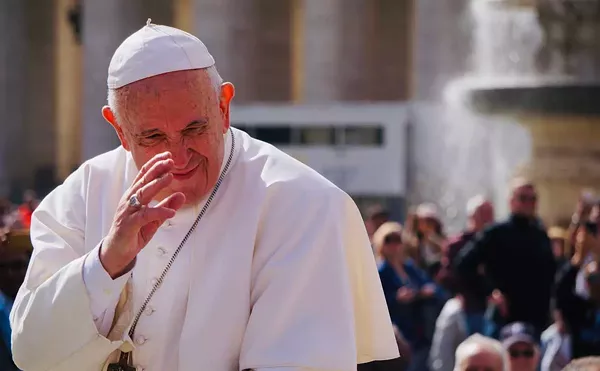
Audio By Carbonatix
[
{
"name": "GPT - Leaderboard - Inline - Content",
"component": "35519556",
"insertPoint": "5th",
"startingPoint": "3",
"requiredCountToDisplay": "3",
"maxInsertions": 100,
"adList": [
{
"adPreset": "LeaderboardInline"
}
]
}
]
More than a few of you will be reading these words from the comfort of a booth at La Shish or Byblos. Nothing better than a shish tawook and lentil soup to take the edge off my heavy trip.
The sabers of the Middle East are rattling, and not just in front of the shawarma rack. At any moment, the Comeback Kid could give Saddam the hotfoot. Israel and the Palestinians have to put together a jigsaw puzzle called the West Bank; Iran is opening up while Afghanistan is closing down. And all over America, the cineplexes are showing The Siege, a film about Islamic fundamentalists laying siege to Brooklyn.
Cast your mind back to the not-so-far-off days when Hollywood gave us a different breed of terrorist. Die Hard (1988) offered perhaps the most cynical villain of all time, Hans Gruber, played to silky perfection by Alan Rickman. Faced with negotiating with a pack of gung-ho dullards including Bruce Willis, he spins some tall tale about holding out for imprisoned comrades in arms. Terrorists always have to have a cause, figures Hans, even if his is only dirty money. The Day of the Jackal (1973) had come and gone. High ends and low means did not compute into a big payday.
Fast forward 10 years. Perhaps the bottom line was not money after all. Only faith can get a man to strap on a bomb and blow himself and dozens of other people up. The thing almost nobody foresaw with the collapse of the Soviet Union and its colonial empire was the unleashing of ethnic and religious fundamentalisms, hitherto kept under wraps. In his book McWorld vs. Jihad, Benjamin Barber suggests that we in the West were in such a hurry to declare history -- aka ideological struggle -- dead, and erect the Golden Arches here, there and everywhere, that we didn't hear the sleeping dogs start to howl.
Despite its ludicrous plot, Executive Decision (1996) gets its kick from the villains, a gang of Islamic fundamentalists who hijack a plane so that they can explode a nerve gas bomb over Washington and be delivered into the arms of Allah, martyrs one and all.
The Siege tries to be a bit more subtle. The CIA, with characteristic aplomb, trains a force to knock over Saddam Hussein and then leaves them to swing in the wind. The survivors of the massacre understandably make their way to our shores for a bit of payback. Alas, at one point in the film, a jingoistic general, played with constipated smugness by Bruce Willis, rounds up citizens of Arabic descent and cages them inside a stadium. The West Bank comes to Brooklyn.
The film may try to be fair, but what about the audience? Ignorance breeds fear. And fear loves nothing more than a scapegoat to roast on its spit. Waco, Oklahoma City and the shooting of abortion doctors all were born from homegrown fundamentalisms. But we're used to white people acting crazy. We're used to Christian radicalism. There's a whole wing of the Republican Party that would love nothing more than to have everyone grow fat for Jesus. But because Islam is a "foreign" religion, practiced mainly by swarthy "foreigners," less is at stake if you demonize someone coming out of a mosque than a Pentecostal house of worship. The World Trade Center bombing, along with the initial Oklahoma finger-pointing, confirmed that, despite a centuries-old ideal of pluralism, American xenophobia runs deep.
On the flip side, there's a strong Orientalism fetish among the educated classes of this country. The English Patient (1996) and Casablanca (1942), both exercises in nostalgia for a Westernized -- aka civilized -- Middle East, will dampen hankies and keep tour agencies happy for generations to come. Mention The Sheltering Sky (1990) to an artist or intellectual and they'll swoon. The film is a dreamscape of exotica -- the Middle East as we'd love to have it -- vast, mysterious, sexy. Bernardo Bertolucci's lovely aesthetic touch does a disservice to the darker tone of the Paul Bowles novel that inspired the film. Bowles was interested in how impossible it was for jaded ex-patriots to get inside the Middle Eastern way of life, try as they might. Even though the two lead characters proclaim that they are travelers not tourists, Bertolucci makes them so. And in the process, the viewer as well.
The only really positive image of Islam that we get from film in the United States comes from Spike Lee. Malcolm X (1992) is the apotheosis of his admiration for the man who might have brought the Nation of Islam into the mainstream. Instead, we now have Louis Farrakhan, another easily vilified figure, doubly so since he's black and a loudmouth.
Nonetheless, Malcolm X shows us the mighty potential for a domestic, pluralistic Islam unyoked from negative connotations. The nihilism of inner-city black America can only be nullified through education, be that secular or religious. Malcolm X knew that and we should too.





